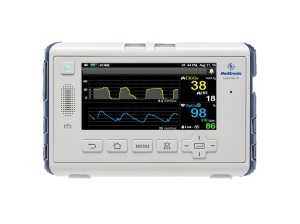Medtronic announces preliminary PRODIGY results, identifying patients at high risk for opioid-induced respiratory compromise

Press releases may be edited for formatting or style | February 18, 2019

DUBLIN and SAN DIEGO - February 17, 2019 - Medtronic plc (NYSE:MDT) today announced preliminary results from PRODIGY, a Medtronic-sponsored, prospective, multi-center study to identify people at high risk for opioid-induced respiratory depression (OIRD), a form of respiratory compromise.
Study results demonstrated that investigators were able to develop an easy-to-use risk prediction tool to identify patients at high risk of developing respiratory compromise, a potentially life-threatening condition causing a progressive inability to breathe adequately. In addition, results showed that more than 40 percent of patients on the general care floor experienced OIRD, which is significantly higher than previously reported in clinical literature.
One goal of the study was to develop and internally validate an accurate risk assessment scoring tool - the PRODIGY score. The PRODIGY score identifies adults on the hospital general care floor receiving opioid medication who are at increased risk for OIRD. Variables used to develop the risk assessment score included age, gender, sleep disorders, chronic heart failure and opioid naïvety. The PRODIGY score performed well, identifying 76 percent of patients with confirmed respiratory depression (AUC=0.7620). Publication of full results is expected in 2019. The study, presented at the Society of Critical Care Medicine's (SCCM) 48th Critical Care Congress in San Diego, California, was selected for the Star Research Achievement Award recognizing excellence in research.
"Clinical evidence shows that acute and unexpected respiratory compromise on the general care floor is increasingly common. Until now, we have not been successful in predicting which patients are at high risk when recovering on the general care floor," said Ashish K. Khanna, M.D., primary study investigator and an associate professor of anesthesiology and intensivist at the Wake Forest School of Medicine. "These data validate an easy-to-use OIRD risk prediction tool to identify patients at the highest risk and guide early intervention using continuous capnography-based monitoring. Early identification and intervention in these high-risk patients has the potential to improve patient safety and decrease the economic and clinical burden of unplanned ICU admissions."
The PRODIGY (PRediction of Opioid-induced respiratory Depression In patients monitored by capnoGraphY) study included 1,496 patients across 16 sites in the U.S., Europe and Asia. This is the largest known study using continuous capnography and oximetry. The initial study publication, "Seeking Answers from the PRODIGY Trial," in the Journal of Critical Care, reviewed respiratory compromise on the general care floor and the study methodology.1 Continuous capnography and pulse oximetry data were collected using Medtronic Microstream(TM) and Nellcor(TM) monitoring technology. Data presented by Dr. Khanna at SCCM showed OIRD occurred in 46 percent of patients. Additionally, all patients experiencing these events were reviewed and confirmed by an independent clinical event committee of physicians with expertise in perioperative respiratory medicine.
|
|
|
You Must Be Logged In To Post A Comment
|

